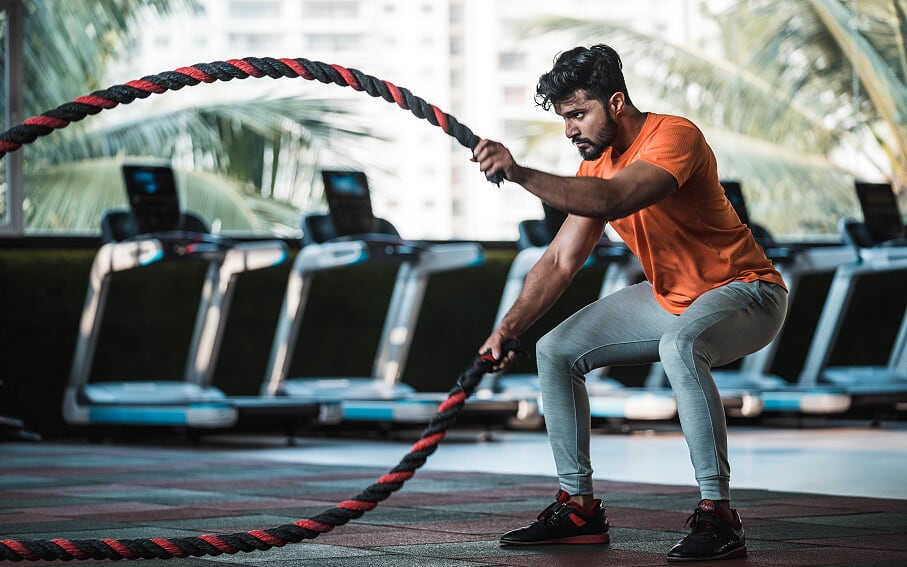Fitness & Wellness
Top 5 mistakes to avoid when working out

We are no strangers to fitness. We love working out, be it a satisfying endurance run or a heavy lift session at the gym, we are constantly working on becoming a better version of ourselves. However, many beginners start out with the wrong advice and may end up harming themselves than doing any good. This might lead to a negative association with getting fit.
We all start at the bottom and realise our mistakes through trial and error or coaches correcting us to exercise better.
Here, we have come up with a list of five most common mistakes that you can avoid with your first ever workout and make progress in achieving your goals.
 A classic mistake noticeable in many beginners and in some cases, a misinformed, advanced trainee, ego lifting is a common phenomenon at the gym. (Source: Zymrat)
A classic mistake noticeable in many beginners and in some cases, a misinformed, advanced trainee, ego lifting is a common phenomenon at the gym. (Source: Zymrat)
Avoid ego lifting
A classic mistake noticeable in many beginners and in some cases, a misinformed, advanced trainee, ego lifting is a common phenomenon at the gym. Lifting weights heavier than your capacity to do so, in order to impress the person next to you is called ego lifting. Gyms are a place to become better and is a guaranteed judgement-free place. Even the most muscular person at the gym will appreciate your efforts in working out rather than running the fastest on the treadmill or lifting the heaviest. So go slow and make progress eventually, anyone who is watching you is cheering you on mentally.
Compromise on form
Social media for the last couple of years has seen an increasing trend in exercise challenges like holding a plank for a number of minutes or performing hundreds of pushups. Though this might inspire you to workout, it paints an unhealthy picture of what exercise actually is. No matter if a person’s goal is to become faster or gain strength, people keep these numbers in mind and chase them while neglecting form. Powerlifting programs are known for their low repetition workouts. This helps them focus entirely on form and that brings about results. So instead of performing 100 push ups with bad form, go for ten perfect ones that will get you the results.
 A functional weights or calisthenics program should include a full body workout 2-3 times a week. (Source: Zymrat)
A functional weights or calisthenics program should include a full body workout 2-3 times a week. (Source: Zymrat)
Full body workouts vs split workouts
Bodyweight warriors and gym enthusiasts can relate to the one misconception faced when first starting into exercise. Though to no fault of the person, many people starting out are told to focus on specific muscle groups like separate days for the upper and lower body, or even a day dedicated to muscles as specific as back and biceps. Unless bodybuilding, or strength sports is your forte, it is not necessary for you to follow this split. A functional weights or calisthenics program should include a full body workout 2-3 times a week. This will help you achieve your goals faster while cutting down on the number of days.
Progressive overload
Progressive overload is your ticket to becoming stronger. Moving on to difficult variations of an exercise is called progressive overload. So if you could curl 10kgs, move on to 12 or 15kg. If pushups are a piece of cake, try clap push ups or archer push ups. These variations will greatly improve your strength while providing you with a challenge. Progressive overload humbles your muscles as you realise that there is always something more difficult than the current variation of an exercise, which helps you incorporate this discipline that you can always perform better. So follow overload not just in the gym, but also in parts of your lifestyle.
 Portion control and portion surplus are two universal rules to losing fat and gaining strength respectively
Portion control and portion surplus are two universal rules to losing fat and gaining strength respectively
Eating wrong
We would be lying if we said simply working out would help you lose weight. In this unfortunate reality, eating and exercising should be balanced in order to get the beach body or other aesthetic goals you are aiming for. Including enough protein, carbohydrates, minerals, vitamins and fibre in your diet will help with muscle recovery, fat loss and increased strength. Portion control and portion surplus are two universal rules to losing fat and gaining strength respectively. So you might be exercising for an hour or two everyday, but those abs will be made in the kitchen.
These mistakes can be easily corrected in the beginning and avoiding them is crucial as it will provide you with an extra boost. Though the road to achieving your strength or aesthetic goals may be tough, avoiding mistakes along the way will help you in many ways.
This article was first published on zymrat.com
Also read: Home Workout of The Week – Strength Training without Weights






